The allure of black hair, long and flowing, has captivated hearts and minds for centuries. But this iconic hair not only exudes beauty, it also holds profound cultural, historical, and psychological significance, transcending mere aesthetics.

The Cultural Significance of Black Hair
Black hair is an intrinsic part of the cultural heritage of many communities around the world.
- Ancient Egypt: In ancient Egypt, long, black hair was revered as a sign of beauty, fertility, and power. Women wore their hair in intricate braids and wigs, adorned with ornaments and decorations.
- Indigenous Cultures: Many indigenous cultures view long, black hair as a symbol of strength, wisdom, and connection to the natural world. In many Native American tribes, for instance, long hair is considered a sign of respect and honor.
- African Diaspora: In the African Diaspora, black hair has become a symbol of identity, resistance, and cultural pride. The hairstyles and textures of black hair have shaped diverse cultures worldwide, from the cornrows of West Africa to the dreadlocks of the Rastafarian movement.
Historical Importance of Black Hair
Throughout history, black hair has played a significant role in social, political, and economic contexts.
- Discrimination and Stereotypes: Unfortunately, black hair has also faced its share of discrimination and negative stereotyping. In many cultures, long, black hair has been associated with unkemptness, unprofessionalism, and a lack of sophistication.
- Civil Rights Movement: During the Civil Rights Movement in the United States, black hair became a symbol of resistance and empowerment. The “Afro,” a natural hairstyle that embraces the volume and texture of black hair, became a powerful statement of pride and self-acceptance.
- Fashion and Beauty: In recent decades, black hair has gained increasing prominence in the fashion and beauty industries. Models and celebrities with long, black hair have challenged traditional beauty standards and inspired a wider appreciation for its natural beauty and versatility.
Psychological Implications of Black Hair
Beyond its cultural and historical significance, black hair also has important psychological implications for its wearers.
- Self-Esteem and Confidence: Studies have shown that women with long, black hair often report higher levels of self-esteem and confidence. This is likely due to the fact that long hair is often associated with femininity, beauty, and desirability.
- Identity and Belonging: Black hair can also provide a sense of identity and belonging for people of African descent. In a society that often marginalizes black culture, owning and embracing one’s natural hair can be a powerful act of self-affirmation.
- Cultural Pride: For many black people, long hair is a symbol of cultural pride and a connection to their ancestors. It can serve as a reminder of the strength, resilience, and beauty of their heritage.
Hair Care for Black Hair
Given its unique texture and characteristics, black hair requires specialized care to maintain its health and beauty.
- Moisturization: Black hair is naturally prone to dryness, so it is essential to keep it moisturized with regular deep conditioning and use of hair products that contain emollients and humectants.
- Protein Treatment: Protein treatments are important for strengthening and repairing damaged black hair. They help to restore the hair’s structure and prevent breakage.
- Protective Styling: Protective hairstyles, such as braids, buns, and twists, can help to minimize damage from environmental factors and reduce hair loss.
- Gentle Brushing: Avoid brushing black hair too often or using brushes with hard bristles, as this can cause breakage and damage.
Conclusion
Black hair, long hair is a multifaceted phenomenon that extends far beyond its aesthetic appeal. It carries deep cultural, historical, and psychological significance for its wearers. By understanding and appreciating the complexities of black hair, we can foster a more inclusive and equitable society that celebrates the diverse beauty and rich heritage of all people.
FAQs
-
What are the different types of black hair textures?
– Type 3A: Loose curls with a well-defined S-shape
– Type 3B: More defined curls that are smaller and springier
– Type 3C: Tight, corkscrew curls that are densely packed
– Type 4A: Coily hair with a defined curl pattern
– Type 4B: Zigzag curls that are tightly coiled
– Type 4C: Fine, wiry hair with little to no defined curl pattern -
How often should I wash my black hair?
– The frequency of washing will depend on your hair type and lifestyle, but most experts recommend washing once or twice per week. -
What are some common hairstyles for black hair?
– Braids
– Twists
– Afros
– Dreadlocks
– Short cuts
– Weaves and extensions -
Can I color my black hair?
– Yes, but it is important to consult with a professional hairstylist to ensure that the color is applied safely and will not damage your hair. -
How do I prevent breakage in my black hair?
– Use gentle hair care products
– Avoid excessive heat styling
– Protect your hair from damage with a leave-in conditioner or serum
– Get regular trims to remove split ends -
What are some tips for growing long black hair?
– Follow a healthy diet
– Take supplements that support hair growth, such as biotin and collagen
– Get regular exercise
– Massage your scalp to improve circulation
– Be patient and consistent with your hair care routine
